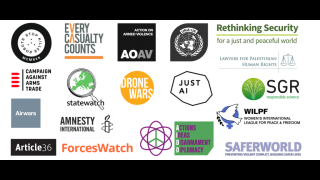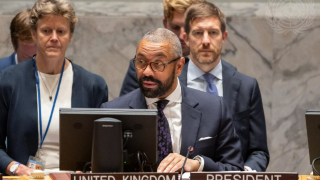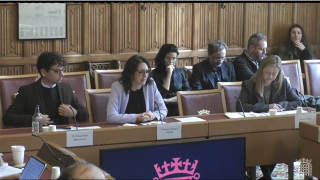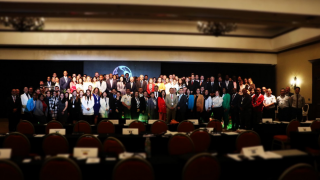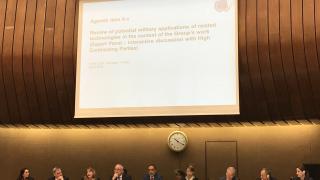
This week governmental experts from around 80 countries are gathered at the UN in Geneva to discuss ways to address the threats posed by Lethal Autonomous Weapons Systems (LAWS), also known as 'killer robots'.
UNA-UK has worked on this issue for over five years, pressing the UK Government to do more to support regulation in an area of weapons research, which, if left to develop unchecked, could have grave implications for humanity. While we welcome the UK's stated intention not to develop LAWS, we are concerned that the international community's lack of urgency on this issue is at odds with the pace of technology and the attendant risks of LAWS being widely developed and deployed.
Ahead of this week's meetings in Geneva, UNA-UK joined forces with a group of tech companies, academics and NGOs to urge the UK to show greater leadership on this issue in support of building international consensus on a framework which will prohibit the development of weapons systems which lack meaningful human control.
Linking the need for action to the UK's aspiration to become a leader in "ethical AI", the joint letter to the Secretary of State for Foreign Affairs makes the point that political leadership from the UK and others is required before it is too late (full text below):
Without concerted action to prohibit LAWS we stand on the verge of a stark dehumanization of how military force might be applied. As a country looking to forge a ‘bold new role’ in the interests of Britain and the world, we believe taking international action to prevent the development of LAWS should be an important strand of the UK’s vision of a ‘Global Britain’. We hope that the UK will start to show leadership towards an international obligation to ensure meaningful human control in the context of autonomous weapons.This week's meetings take place through the Convention on Certain Conventional Weapons (CCW) – a treaty making forum designed to regulate inhumane weapons which has been examining the issue since 2013. Current discussions focus on the need to develop a shared understanding of the “characteristics” of LAWS and the “touchpoints” of human/machine interaction within weapons systems. With the recent addition of Austria, so far 23 countries have explicitly called for a ban on LAWS.
UNA-UK is a member of the Campaign to Stop Killer Robots - read the Campaign's recent press release for more info and follow @bankillerrobots and #CCWUN on Twitter to follow proceedings in Geneva.
Letter to the Secretary of State for Foreign Affairs (full text)
The Rt Hon. Boris Johnson MPSecretary of State
Foreign & Commonwealth Office
King Charles St
London SW1A 2AH
9 April 2018
Dear Secretary of State,
We appreciate the UK’s commitment to international leadership in “ethical AI”, as heralded in the Prime Minister’s 2018 Davos speech. Such leadership is socially important and builds on the UK’s strengths in research and innovation as well as positioning the UK as a global leader in this area.
We are concerned, however, that without political leadership to limit the role of AI in certain functions of weapon systems, wider efforts to establish an ethical approach to AI could be undermined.
Empowering algorithms to identify and select targets for the use of weapons raises fundamental challenges regarding the role of machines in society. If we are prepared to accept that empowerment, without some obligation for meaningful human control in its functioning, then it becomes hard to see in principle what other functions AI-systems should be barred from undertaking.
We welcome the UK’s stated intention not to develop Lethal Autonomous Weapons Systems (LAWS) but believe that clear international consensus on this would send a strong signal to all those around the world working on AI.
The UK has an opportunity to show leadership at the meeting of the Group of Governmental Experts on LAWS at the UN Convention on Conventional Weapons taking place this week in Geneva. We call on the UK to use that meeting to articulate its commitment to meaningful human control over weapon systems, and to work to build consensus on the mechanisms through which sufficient human control can be achieved.
A large number of tech-sector entrepreneurs, as well as the global engineering professional body the IEEE, have already made clear their recognition that meaningful human control needs to be retained as the capacity for autonomy in weapons systems develops. Such a commitment will not limit innovation in AI. Nor does it amount to a blanket exclusion of AI-functions or autonomous capacities in the military sphere.
The development of AI capacities offers great social and economic potential and the UK is ideally placed to benefit from that potential as well as to help, at an international level, to avoid the attendant risks. However, developing ethical AI leadership requires us to show leadership in all areas where AI can have a transformative effect.
Without concerted action to prohibit LAWS we stand on the verge of a stark dehumanization of how military force might be applied. As a country looking to forge a ‘bold new role’ in the interests of Britain and the world, we believe taking international action to prevent the development of LAWS should be an important strand of the UK’s vision of a ‘Global Britain’. We hope that the UK will start to show leadership towards an international obligation to ensure meaningful human control in the context of autonomous weapons.
We remain committed to ongoing dialogue that can ensure that such an obligation supports our shared vision of AI for the social good.
Yours sincerely,
Sophie Ghislaine Boddington, Creative Director, BDS Creative Ltd – bodydataspace
Ben Donaldson, Head of Campaigns, United Nations Association – UK
Heidi Dyson, Director, Next Level Innovation Ltd
Nic Greenway, Co-founder, React AI Ltd
Fiona Harte, Consultant Head of Commercial, Merali Beedle LLP
Dr Rebecca E. Johnson, Executive Director, Acronym Institute for Disarmament Diplomacy
Andrea Kulakov, Founder, NI TEKNA -Intelligent Technologies
Dr. Ryan Layne
Antti Lyyra, PhD Candidate, London School of Economics and Political Science
Richard Moyes, Managing Director, Article 36
Dr Nicolas Tonello, Director, Renuda UK
Rich Walker, Managing Director, Shadow Robot Company Ltd
Image: Delegates discuss LAWS in Geneva, 12 April 2018, credit: Campaign to Stop Killer Robots


